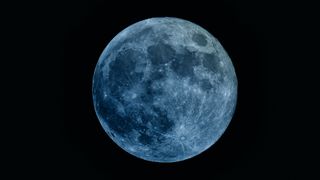Lunacy, Part II
Blue moon
You saw me standin' alone
Without a dream in my heart
Without a love of my own

Everyone except starry-eyed songwriters and perhaps The Flat Earth Society knows that the moon isn't blue (well, it might be blue and lonesome out there on its own but its primary color palette is shades of gray and black). No, wait. I take that back. There are two instances where the moon turned a distinct blue. It happened first in 1883 when the Krakatoa volcano erupted and spread ash as high as 50 miles into the atmosphere. The ash particles, about one micron in size, filtered out red light and hence the actual blue moon.

The second instance occurred in 1950 when smoke from forest fires in Alberta, Canada, turned the moon pink, blue, and purple.
True colors aside, we have the blue moon that astrophysicists and astronomers know well. A blue moon, to quote the original definition, is the "third full moon in a season that has four full moons." The subsequent reduction and more popular version of this definition is "the second full moon within a single calendar month."
So, why write about blue moons? It came to mind because we had one on August 30; in fact, we had a "super blue moon," which means it was blue (not) and at its closest orbital point to Earth. The proximity makes the moon appear larger (it's not), hence the term "super." The event is of note, to stargazers if no one else, because the next super blue moon doesn't happen until 2037.
No one seems to know for sure how the duolunararity was dubbed blue. All we know is the secret cabal that produces the Maine Farmer's Almanac came up with it way back when (sometime around the 1930s; no exact date given). This leads one to wonder, of course, what they were smoking at the time. Whatever it was, it resulted in a glaring inconsistency. Why didn't they call the harvest moon the orange moon, for example? After all, they came up with pink moon and strawberry moon, We will never know.

Finally (at last you are thinking), most people are familiar with the phrase "once in a blue moon," which signifies that something doesn't happen very often. Like many cliches, it's a tired expression. One could juice it up a bit, I suppose, by saying "once in a super blue moon." Or we could combine it with other exhausted phrases like "when hell freezes over," which might turn out something like "when lunar bluation and underworld glaciation occur simultaneously." The shorthand term for this is lunainfernofrostifibluing.
Finally (really this time), the song "Blue Moon" ends with this refrain:
And then there suddenly appeared before me
The only one my arms will ever hold
I heard someone whisper, "Please adore me"
And when I looked, the moon had turned to gold
Does the moon ever turn gold? I'll leave you to judge with this lunar color chart from NASA.


Comments
Post a Comment